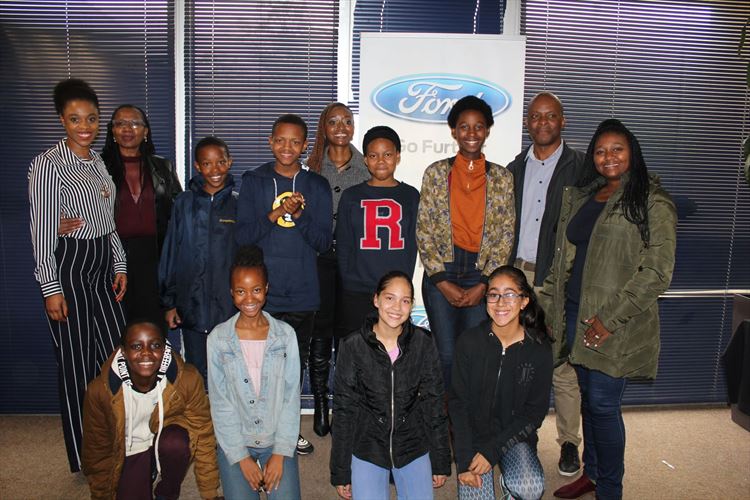Ford news

QuickPic | January 23, 2020
Ford Invests in Developing Leaders Through Education
- In celebration of International Day of Education, Ford SA announces R1-million donation to the Student Sponsorship Programme (SSP)
- Ford commits to sponsor 10 academically distinguished Scholars from under-resourced communities with a five-year high school leadership award.
- SSP aims to achieve gender equality and break the cycle of poverty through education
Pretoria, South Africa, 23 January 2020 – Education is humanity’s greatest renewable resource. It is a fundamental human right, and a public responsibility. Without inclusive and equitable quality education and lifelong opportunities for all, we cannot hope to succeed in achieving gender equality and breaking the cycle of poverty that is leaving millions of children, youth, and adults behind.
Today, 258 million children and youth still do not attend school; 617 million children and adolescents cannot read and do basic maths; less than 40 per cent of girls in sub-Saharan Africa complete lower secondary school, and some four million children and youth refugees are out of school. Their right to education is being violated and it is unacceptable.
In celebration of the many ways that learning can empower people, preserve the planet, build shared prosperity, and foster peace, Ford Motor Company of Southern Africa (FMCSA) has chosen the 24th of January, International Day of Education, to announce a R1-million donation to the Student Sponsorship Programme (SSP).
A non-profit trust, the SSP initiative provides opportunities for high-achieving learners from under-served communities to attend some of the top public and private high schools around the country. The programme also supports Scholars with leadership development through Personal Mastery and Mentorship. The Leadership development approach and package has led to many graduates of the SSP outperforming their peers, at both high school and university undergraduate level.
Ford has committed to sponsoring 10 academically distinguished yet economically disadvantaged students, who will each receive the SSP five-year leadership programme award, during which time they will receive a comprehensive suite of support services, including payment of the tuition, uniform, sports gear, academic monitoring, mentorship and finally entering into the SSP Alumni network.
“The Student Sponsorship Programme is a unique opportunity to assist talented young people to achieve their full potential, thus breaking the cycle of poverty,” says Neale Hill, MD of FMCSA. “Ford is committed to making a real difference in peoples’ lives, and by sponsoring these students through this programme, we are empowering the youth to become the future leaders of this vibrant country.”
“Our aim for these scholarships is to address and combat the critical socio-economic issues, such as poverty, unemployment and inequality that many South Africans face today,” he adds. “This programme seeks to minimise the impact of the challenges faced by low-income students, and provide a platform for leadership development.”
The beneficiaries are selected by the SSP team from various feeder primary schools in townships, the inner city, peri-urban, and rural areas of Johannesburg, Pretoria, East London and Grahamstown. Around 67 per cent of the students enrolled in the programme are female, 93 per cent are black, and all come from low-income households.
The students are afforded the opportunity to attend schools which are ranked among the best in South Africa, and in the top 100 in Africa. Qualifying criteria for the selected schools are based on Matric results, university exemption rates, overall academic excellence, and opportunities for broader learning experiences beyond the classroom.
Schools such as American International School Johannesburg, Selbourne College, Parktown High School for Girls, and Pretoria Boys’ High School are some of the institutions that exhibit these high standards, and are among the nominated schools these students attend.
Many young people, through SSP, have gone on to occupy influential leadership positions in their chosen fields, and have positively impacted the lives of their families, local communities, South African society, and the broader economy. Graduates from SSP also serve as mentors for current students through its Alumni network.
Since the inception of the Student Scholarship Programme in 2000, over 1,500 gifted students have been awarded bursaries by SSP, valued at more than R150-million. These students have achieved a 100 per cent Matric pass rate, and 99 per cent of SSP Scholars earned university acceptance.
The Student Sponsorship Programme has a wide range of success stories, notably Tinhiko Nkuna, SSP class of 2004, who attended St Mary’s School in Waverley, Johannesburg. She went on to obtain her Bachelor of Education Honours in Education Management, Postgraduate Certification in Education, FET and Senior Phases in History and French from the University of South Africa, as well as a Bachelor’s Degree in Law and French from Rhodes University. Nkuna chose the path of an educator, first teaching history, and subsequently being appointed as the first black Deputy Head in 2017 – the first in St Mary’s 130-year history.
“Tinhiko’s passion and vision for educational transformation has been evident in her teaching and in her role as head of Phelps House,” says Deanne King, Head of St Mary’s School. “She will lead innovation through all the educational focus areas, including the social, generational, and transformational innovation that we aspire to at St Mary’s.”
According to SSP, between 2000 and 2018, SSP students have achieved an average of two distinctions in Matric, with that number climbing to an average of 3.2 distinctions from 2016 to 2018. Around 76 per cent of its graduates have secured a job within three months of completing their tertiary education, with 100 per cent doing so within a year. Approximately 23 per cent of these jobs are in the commerce, financial, and professional services sectors, with 13 per cent focusing on education, and 11 per cent selecting media, arts, and culture.
Ends
Caption: Ford Management with 10 academically distinguished scholars that will each receive the SSP leadership programme award.
Original article and image as supplied by QuickPic











